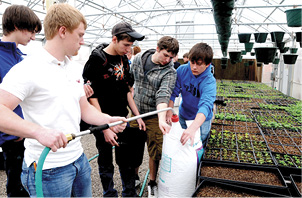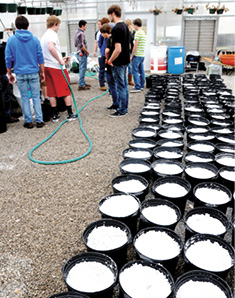New project at CCHS aimed at teaching latest vegetable growing method, as well as supplying schools with food
The Clinton County High School Agriculture classes are gearing up for the growing season and before the school was let out for spring break, several classes were preparing pots to start a new project that should yield a surplus in tomatoes.
In the past several years, the process of hydroponics has become very popular among greenhouses across the world and this process has proven to be the perfect set up for places without good soil or teaching situations in order to produce high quality fruits and vegetables.
Clinton County Ag teacher Matt Johnson is very excited about getting this project underway.
The tomato plants are planted in a growing medium that promotes very good drainage when water and fertilizers are added to the plant.
The white substance takes the place of soil and because it drains so well and the fertilizers are mixed in with the water, it allows the plants to soak in the nutrients.
“This stuff is going to have a constant stream of water, so it provides good drainage,” Johnson said. “It’s going to be a really neat program.”
The tomato project is going to consist of 154 plants and will take up much of the greenhouse space at the high school. In the past, the greenhouse was used to grow annuals that were sold to the public in order to raise money for the agriculture department.
Johnson said he is still going to do some of that, but hopes the tomatoes will take off and the classes can work solely on vegetables in the future.
“It’s going to do away with some of our plants and pepper production … as well as the hanging basket production,” Johnson said. “I didn’t know how much room it was going to take up.”
Johnson said the project first came up when former Superintendent Micky McFall held the position.
“I was going to write a grant for it, but the stipulations for the grant were going to be too stringent for what we wanted to do,” Johnson said. “The minimum for the grant was $20,000 and I researched it and went to the board and told them, ‘I think we can do what we need to do for $5,000,'” Johnson said. “The tomatoes produced during the school year will be bought by the schools. In the State of Kentucky they will get a 20 percent rebate for buying a Kentucky Proud product.”
The ag department is a Kentucky Proud Producer. There are several Kentucky Proud Producers in the county already, including Cravens Greenhouse, Steve’s Best Bar-B-Que Sauce and Crazy Gary’s Bar-B-Que Sauce.
“I’ll be ordering all the official stuff later,” Johnson said. “I’m really excited about it. I think it’s a program changer. It’s something state of the art for the kids to work on. This is the trend as far as vegetables are concerned. This process wasn’t even taught when I was in college and that was 12 years ago. This has come about in the last seven or eight years as a way of serious production. I don’t have any hydroponics experience, so this is a learning experience for me as well.”
Johnson said he couldn’t have started this project without Superintendent Charlotte Bernard and the school board.
“They were instrumental in getting this project started,” Johnson said. ”
Johnson said in the future he would like to experiment with strawberries and maybe even cucumbers.
“I would like to do a lot of the vegetables that the lunch room would use,” Johnson said. “I would like to provide whatever they need. During the summer we will sell a lot. A lot of people have gardens, so I don’t know how the market will be, but it’s going to be a program changer for us. The kids have all bought into it and they all have been out here working.”
Johnson said everything will be automated. The plants will be watered automatically and with the fertilizer already mixed in with the water, it will almost be self sustaining.
“The only thing we will have to do is prune the plants and pick the vegetables and weigh them,” Johnson said. “The only thing I lack from being fully operational is being trained on vegetable inspection. I think that is either a four or eight hour training in Somerset I will take.”
Johnson said the process of hydroponics should produce more vegetables quicker with the plants.
“Tomato plants usually produce vegetables in 90 days,” Johnson said. “The plants we have now are at about 40 days. This should be a really good thing for the district as a whole, as well as the community. It allows us to serve the community … it’s going to help.”
With the plants at 40 plus days, Johnson said they will be producing vegetables all summer and it could provide some students with summer jobs.
“I’m going to have to hire some of the kids to work this summer,” Johnson said. “I’ll have to have someone to pick the tomatoes. If this works out, we will convert to mostly vegetable production. There are some people in the county producing flowers that we are competing with. It would probably help them and us both if I could find a niche to market our products and we wouldn’t compete with them that way.”

Above, Clinton County Agriculture students saturated a bag of potting compound used in a new, state of the art, form of growing plants called hydroponics. The students will use this method to grow tomato plants this spring and will have tomatoes available to sell this summer.
In the photo below, Agriculture students put the finishing touches on one stage of hydroponics Friday before classes were dismissed for spring break.

Ag teacher Matt Johnson said the students will begin transplanting the tomato plants next week when classes resume. The Ag Department will provide the entire school district with tomatoes during the summer and fall.



